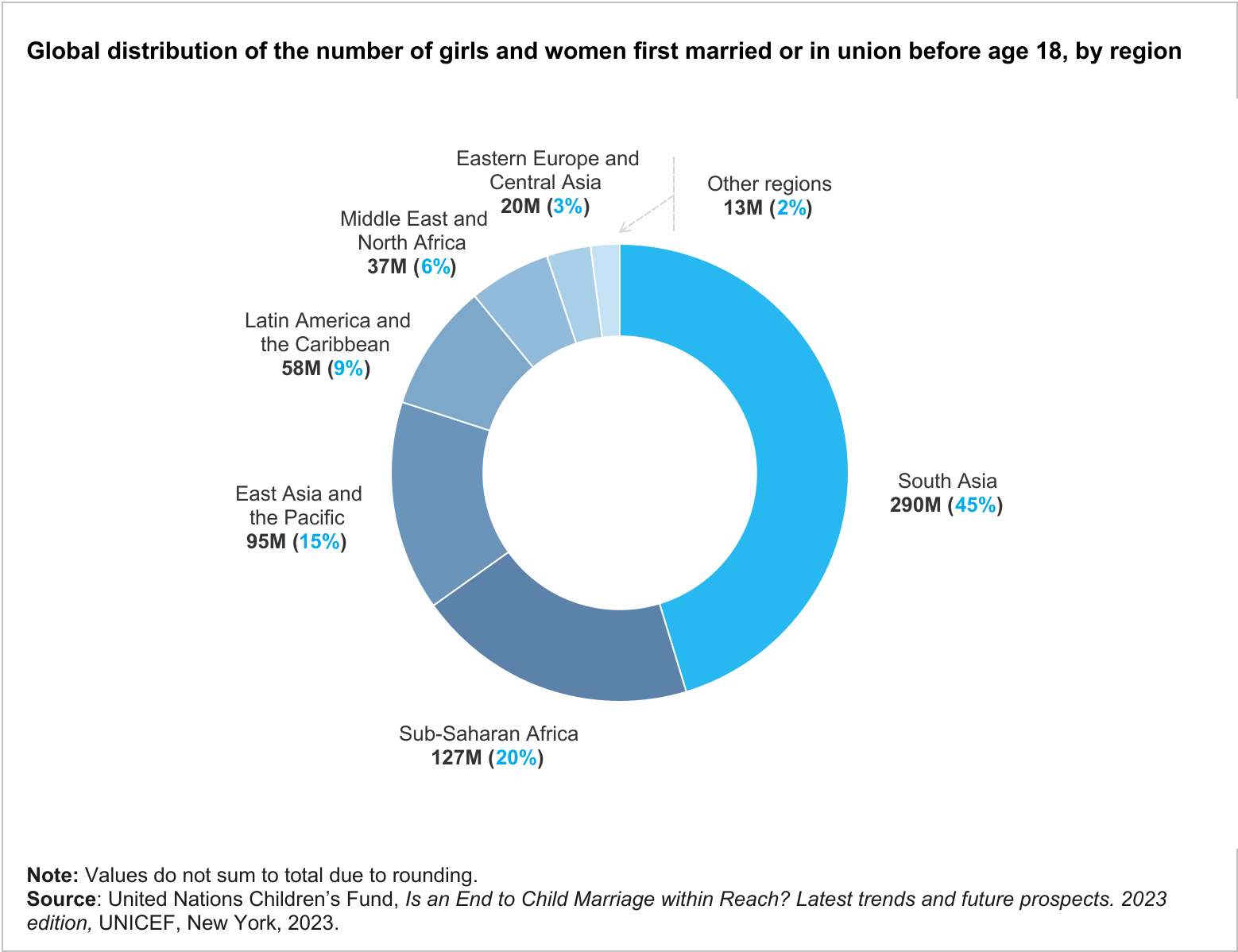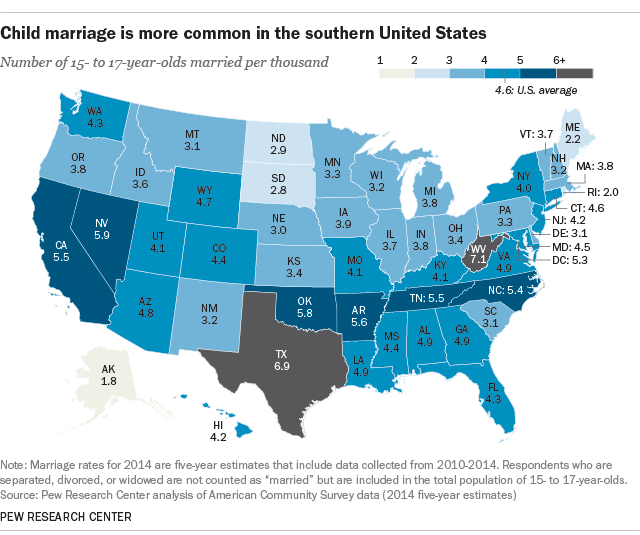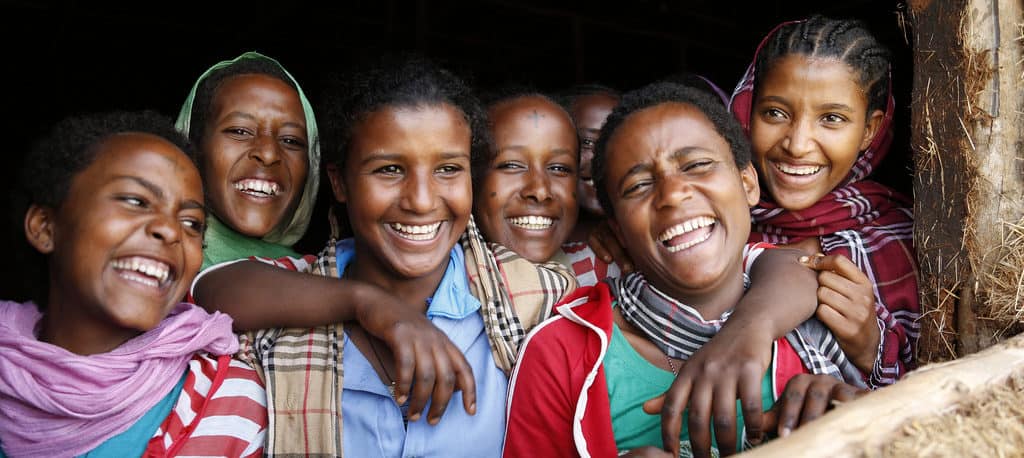Child marriage is a formal union where one or both parties are under 18 years old. In many places around the world, marriage under the age of 18 is part of a culturally accepted norm, and about 10 percent of the global population is married before their 18th birthday.[1] However, in certain cases child marriage can amount to slavery. At Freedom United, we use these indicators to help determine when child marriage constitutes slavery:
- a child has not genuinely given their free and informed consent, for example being given in marriage against his or her will;
- a child is subjected to control or a sense of “ownership” through abuse and threats, and is exploited for their labor and/or non-consensual sexual activity once in a marriage;
- the inability of a child to leave a marriage he or she no longer wishes to remain in.
The younger a child is, the less control they have to give their free consent to marriage and the more vulnerable they may be to slavery.
Girls who are victims of forced child marriage can find themselves subjected to abuse, sexual exploitation, and control, with little or no power over their own movements. Often, the girl will be controlled through violence, threats, and humiliation, and find herself unable to safely leave the marriage.
DONATE NOW
Please chip in today and help us keep up the pressure to end forced child marriage.
What does child marriage look like around the world?
“The marriage – it didn’t go well. Each time my husband wanted to make love to me, he would beat me. He wouldn’t allow me to leave the house. I felt so depressed that I tried to take my own life.” –Lamama, 15, Cameroon [2]
Lamama was forced out of school to marry her husband, and sadly her story is just one of many. Statistics suggest that one-third of girls in the developing world are married before the age of 18, whilst one in nine enter into marriage before the age of 15.[3] If this trend prevails, 150 million more girls will be married before their 18th birthday by 2030.[4] Although boys are also married as children, girls are more disproportionately affected by child marriage. This is often because girls are not valued as highly as boys in the communities where child marriage takes place – in these cases, marriage may be seen as a way of easing the economic burden on the girl’s family.
Child marriage thrives in many countries, but it is most commonly found in South East Asia and sub-Saharan Africa; Niger is estimated to have the highest proportion of child marriage, with 76 percent of girls married before they’re 18.[5] This is because rural areas are typically more impoverished, and consequently prospects for girls are more limited. Rural areas often have more traditional outlooks and girls who are unmarried may have to deal with the pressure of their community’s disapproval. Figures also show that girls from poorer backgrounds are more likely to be child brides; females in the poorest quintile of the world’s population are 2.5 times more likely to be implicated in child marriage than those living in the wealthiest quintile.[6] While the majority of forced marraiges occur in low-income countries, 26% of all forced marriages occur in high or upper-middle-income countries, such as the United States.[7]

Image credit: Unicef
What are the causes of forced child marriage?
There are many factors that contribute to child marriage around the world. Often, these contributing factors propagate an environment that encourages forced child marriage and increases the vulnerability of children to slavery. In this section, we’ll discuss a few of the main causes:
Poverty
In the developing world, over half of girls from the poorest families are married as children.[8] For some families, giving a daughter in marriage is a way to reduce expenses – particularly if a son’s education and expenses are prioritized. In some communities, the groom and his family will expect a dowry from the bride’s family – with the idea this money will ensure her care for the foreseeable future. Often, the younger the girl is the lower her dowry – this is because she will be seen as easier to control in her new home and more likely to be a virgin.
Social and religious traditions
In many areas, it is the norm to marry children young. Peer pressure can force parents into marrying their children and can place pressure on young girls to conform to marriage and risk being viewed as a “nasty, disrespectful girl”.[9] The fear of pregnancy outside marriage is also a major driver, and early marriage is seen as a way to safeguard against perceived immoral behavior.
Gaps in the law and the failure of law enforcement
A lack of strong, effective legislation protecting girls or creating a minimum age of marriage is a key factor. However, even when there are laws in place, law enforcement may not reach into rural areas, may not have the training to deal with cases of forced or underage marriage, or may not view it as their responsibility to interfere with family affairs. Corruption in the system can also allow perpetrators to pay money to delay or avoid court procedures.
What is the state of forced child marriage in the United States?
Sherry Johnson was forced by her parents to marry a man almost twice as old as her when she was only 11 years old. He had statutorily raped and impregnated her, making her a mother at only 10 years old. In seven years of marriage, she had a total of six children and had to drop out of school to care for them. When she finally gathered the courage to leave her husband at 17, she was unable to get a divorce because she had not yet reached adulthood and had no access to the legal rights that come with it.[10]
And Sherry’s story is by far not the only one. Between 2000 and 2018, over 300,000 minors were married in the United States, with an estimated 78% being girls under the age of 18 who were married to adult men.[11] Accurate figures on child marriages are elusive, and there is a notable lack of statistics concerning the extent of forced child marriages in the country, highlighting the minimal attention this issue has garnered.

Image credit: Global Citizen
Right now, only 11 out of the 50 states have legislation that bans marriage under the age of 18, leaving children vulnerable to forced child marriages.[12] Considering that the legal age in the cast majority of U.S. states is 18, their inability to independently initiate divorce proceedings intensifies the barriers they face in escaping forced marriages, effectively trapping them in “wedlock.”
Forced child marriages bring with them a potential for abuse and exploitation, that largely goes unnoticed. Women who marry as minors are more likely to drop out of school, face a significantly higher risk of future poverty, encounter more health and mental health issues, and experience higher rates of divorce. Child brides are three times more likely to suffer from domestic abuse and twice as likely to fall into poverty and drop out of school.[13]
What is being done to tackle forced child marriage?
By tackling early child marriage in countries where girls are vulnerable to slavery, we can help put an end to forced child marriage and slavery. On a global level, there has been some progress made towards this goal. In 2015, a target on tackling child marriage was included in the UN Sustainable Development Goals: “Eliminate all harmful practices, such as child, early and forced marriage and female genital mutilations”.[14] This target urges member states to put in place policies and practices to abolish child marriage by 2030. However, there is a lot of work to be done to ensure that this target is achieved. Here are some examples of what organizations are doing to help end the practice of early child marriage:
- Working with communities to change attitudes towards girls and to ensure that they are more highly valued.
- Supporting girls to stay in school and continue their education.
- Providing safe spaces and support networks for girls at risk of child marriage.
- Engaging with religious leaders to encourage them to take a greater role in condemning child marriage and changing community attitudes.
- Working with men and boys to change patriarchal attitudes whilst also supporting young people and youth groups to become agents of change.
- Urging local authorities to adopt stronger laws and policies to reduce cases of forced and early marriage.[15] You can read about Freedom United’s campaign which helped successfully prevent the legalization of child marriage in Iraq.
- This includes banning marriages below the age of 18 to prevent and criminalize forced child marriages. Find out more about how we helped ban child marriages in England and Wales.
- Using media channels to raise awareness and highlight the negative consequences of child marriage and other advocacy and lobbying techniques.
Freedom United is running a campaign to urge U.S. legislators to raise the age of child marriage to 18. By raising the age of marriage, we want to allow children to finish their education and provide them with the opportunity to make informed choices, therefore reducing their risk of falling into forced marriage. Furthermore, this criminalizes marrying a minor and can help prevent child marriage without the child’s consent. Lastly, children below 18 are empowered to make their own decisions, having access to a full spectrum of legal rights. You can help by signing our general petition here and our petition on the United States here.
Learn more
Other organizations working on this issue
SOURCES
[1] http://www.fairobserver.com/interview/a-conversation-on-child-marriage-with-amnesty-international-11402/
[2] https://plan-uk.org/about/our-work/child-marriage/a-violent-marriage-lamana%E2%80%99s-story
[3] http://www.icrw.org/child-marriage-facts-and-figures/
[4] http://www.icrw.org/child-marriage-facts-and-figures/
[5] https://www.unicef.org/media/files/Child_Marriage_Report_7_17_LR..pdf
[6] https://www.unicef.org/media/files/Child_Marriage_Report_7_17_LR..pdf
[7] https://www.ilo.org/wcmsp5/groups/public/@ed_norm/@ipec/documents/publication/wcms_854733.pdf
[8] http://www.girlsnotbrides.org/why-does-it-happen/
[9] http://www.marieclaire.com/politics/news/a14087/niger-child-bride-arranged-marriage/
[10] http://www.bbc.co.uk/news/world-africa-27619295
[11] https://abcnews.go.com/US/child-brides-us-share-stories-exploitation-learning-wife/story?id=64589713
[12] https://www.jahonline.org/article/S1054-139X(21)00341-4/fulltext
[13] https://www.unchainedatlast.org/laws-to-end-child-marriage/
[14] https://abcnews.go.com/US/child-brides-us-share-stories-exploitation-learning-wife/story?id=64589713
[15] http://www.girlsnotbrides.org/child-marriage/niger/


-
Follow us on Facebook
5.6M
-
Follow us on Twitter
32K
-
Follow us on Instagram
8K
-
Subscribe to our Youtube
5.7K
Donate